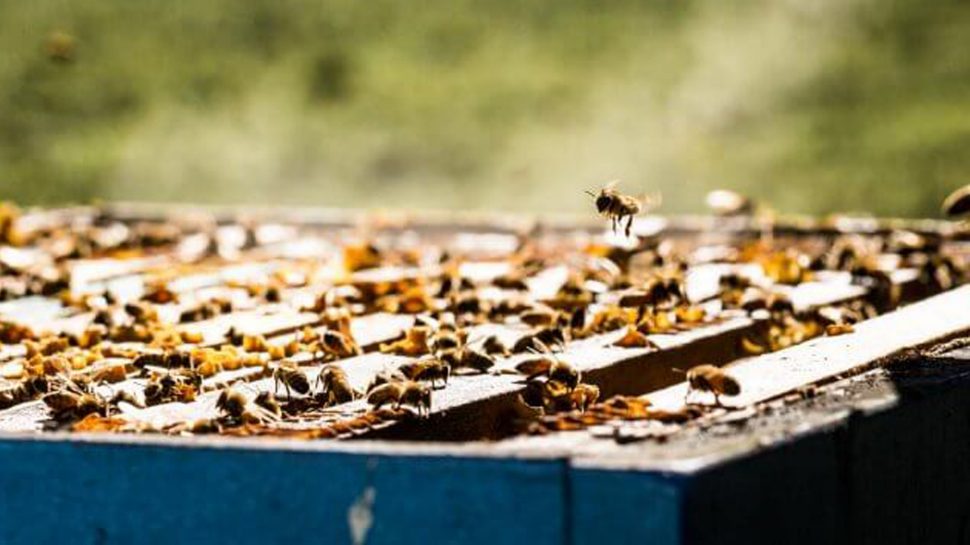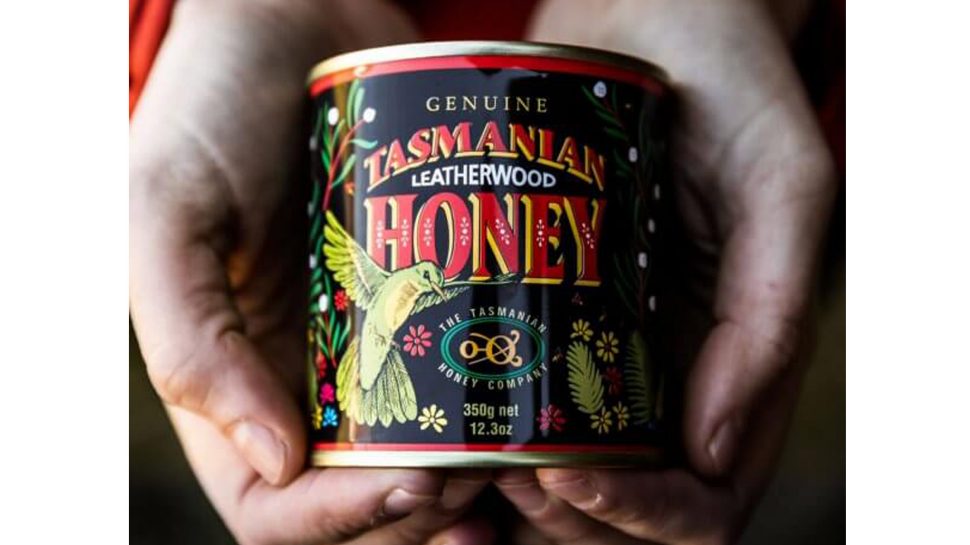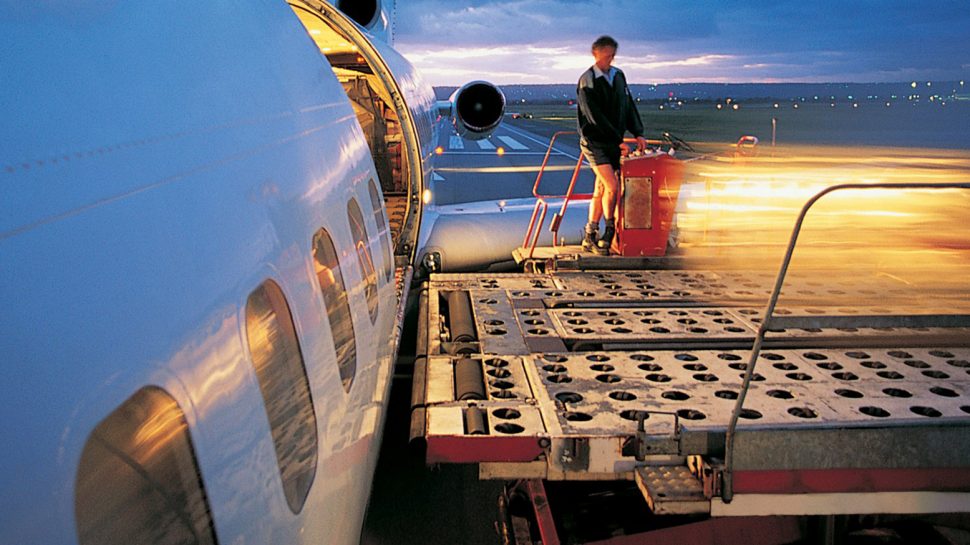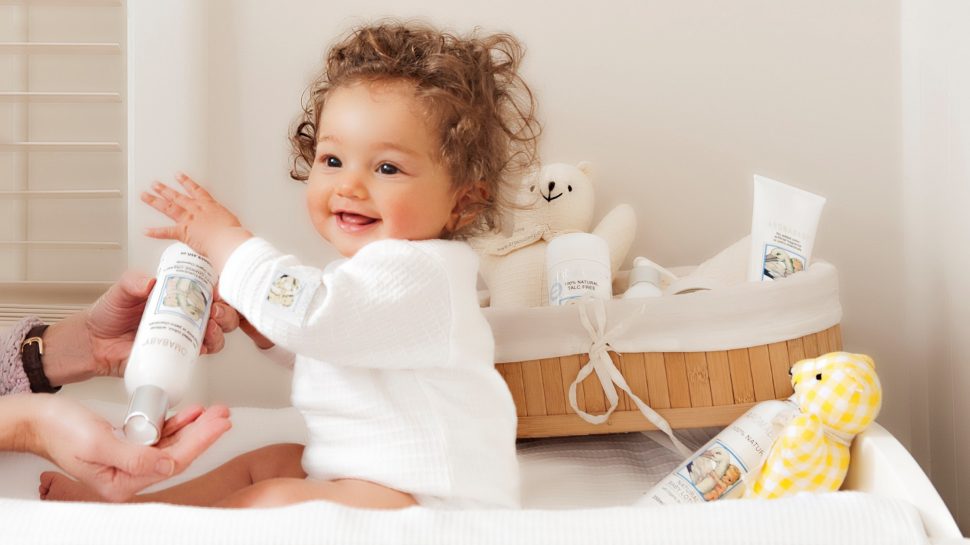Video: Illustration of a woman holding a phone with an Australia Post envelope beside her.
Text: Small Business Smarts
Audio: Upbeat background music plays
Video: Open to wide panning shot of a grassy field. Julian Wolfhagen opens the card door of his white Ute and steps out on to the field. Wide panning shot of the bee yard in the field. Julian puts on his protective beekeeping gear beside his truck, brood boxes (crates) visible in the foreground and bees are flying around the field. Extreme close up of bees on honeycomb.
Text: Lin Evlin reporting
Video: Cut to a close up of a tin of honey being slowly poured into a glass jar. Dissolve fade into a wide panning shot of a retail store with tabletops and shelves stocked with honey products. Close up of tins on a shelf, the label reads: Choice Tasmanian Meadow Honey. Cut to close-up of an outdoor sign that readsL Tasmanian Honey Co. Producers of the famous leatherwood honey – visitors welcome.
LIN EVLIN VOICEOVER: Like bees around a honey pot, this liquid gold has a devoted following and is returning a small fortune to this small business.
Text: The Tasmanian Honey Company.
Video: Interview with Julian in profile shot, with the bee yard in the background behind him. Bees fly around him as he speaks to the camera.
Text: Julian Wolfhagen – owner, The Tasmanian Honey Company
Video: Cut to wide panning shot of the bee yard with bees flying around. Cut to medium shot of Julian reaching into the back of his ute and grabbing various tools. Cut to close up of Julian working with a “smoker tool”. Cut to extreme long shot of the surrounding view; a large grassy field with sheep in the middle ground and rolling hills into the background. Close up of Julian’s hands as he uses the smoker tool.
JULIAN WOLFHAGEN: The most special part about our honey is that it’s all sourced from wild landscapes basically, so it’s completely naturally organic honey. There’s no farming, there’s no industry. No pollution of any sort. And it has a wild vitality that gives it all sorts of health promoting benefits.
Video: Two people wearing full protective gear including masks and gloves walk out from behind the ute holding smoker tools and walking forward towards the bee yard. Julian walks through the field using the smoker tool. Cut to one of the other workers in the field working in one of the brood boxes. Close up of the worker pulling out a bee frame from the box covered in bees. Cross fade to close up of honey slowly being poured into a glass jar. Cut to close up pan of dozens of bees on a bee frame being held up to the camera by Julian. Medium shot of Julian turning the frame around in his hands. Cut to aerial shot of the Tasmanian rainforest.
Lin VO: The golden harvest is this, pure leatherwood honey. The bees gather pollen from the flowers of ancient leatherwood trees growing in Tasmania’s pristine rainforests.
Video: Dissolve fade-in to close up of the trees, bees visible flying around. Cut back to interview with Julian, profile shot, speaking to the camera in the field, bees flying around behind him. Cut to panoramic view of the tree-lined field, rolling hills in the background. Camera follows Julian in his protective gear has he walks through the bee yard with his smoker tool.
JULIAN: Our leatherwood is the only one that produces this very distinctive flavoured honey. The only part in the world that it actually grows. And it’s quite unlike any other honey. It’s a flagship for Tasmania, and for our business.
Video: Back to medium shot of Julian working above one of the brood boxes with the smoker tool. Cut to shot of Lin standing and talking with Julian as he works in the yard. Bees are flying around
LIN: The smoke is giving them the warning that we’re coming.
JULIAN: We’re coming, that’s it, make them go away. Come on bee.
Video: Close up of Julian pulling out one of the bee frames from the box, covered in bees.
JULIAN: Beekeepers know we’re just starting to go through our hives for the first major spring inspection, putting new queens in.
Video: Julian pulls out the bee frame and holds it up for Lin to see, showing her the queen bee. Camera pans down to a close up of the bees working. An animation appears to circle the queen bee and Julian points to it
JULIAN: Here you go.
LIN: I can’t see her.
JULIAN: There she is.
LIN: Ah. There.
JULIAN: there’s a long pointy abdomen.
Video: Cuts back to Lin and Julian standing in the field, the bee frame back in the box. Lin eats some honey off of a small tool and hands it back to Julian
JULIAN: Try it, see if you can taste it
LIN: So fresh
Audio: Julian laughs.
Video: Cut back to interview with Julian, profile shot, speaking to the camera in the field, bees flying around behind him. Cut to a black and white still image of a much younger Julian squatting beside a brood box, holding up a bee frame covered in bees and smiling at the camera. Cross fade back to Julian working in the yard, holding up a bee frame covered in bees, his white ute in the background. Cut to close up of the bee frame in his hands
JULIAN: My background was growing up on a farm in the central part of Tasmania. The men on the farm hunted the wild bees. The annual honey supply for their families.
Video: Cut back to low angle shot of Julian in the field, the bee frame covered in bees in his hands. Bees flying around above him has he slowly turns the frame over
LIN: After working for several years in the corporate world, Julian decided on a return to a life on the land.
Video: A wide shot of the exterior of the Tasmanian Honey Co building. In front, the sign reads: Tasmanian Honey Co. Producers of the famous leatherwood honey – visitors welcome. An animated text box pops up in the bottom left corner which reads: Julian established the Tasmania Honey Company in 1978. Inside the building, Julian and Lin walk through a factory setting, talking and laughing, with boxes and equipment visible in the background. Cut to a close up of a glass jar being placed by a worker on an industrial steel bench under a large tap, honey pours from the tap into the jar. As the jar fills up, it is quickly removed and replaced with another empty jar, honey again pours from the tap into the jar. Cut to a high angle of the same bench as the second jar again fills up, is removed, and replaced by another empty jar. The camera pans across with the workers hand as they place the jar on a neighbouring bench, which has several other full jars of honey on it already. Cut to a wide shot of the worker at the bench, we can now see the woman taking empty jars and filling them. Next to her, another woman takes the full jars and uses a machine to place lids on the jars, and behind her are two more workers filling boxes with jars.
JULIAN: The concept of becoming a beekeeper and producer of honey re-emerged and it’s been the course of my life since.
LIN: Once he started the business, Julian struggled to produce and manage enough bees to run a profitable enterprise.
Video: Crossfade into the opposite view of the two female workers, with the woman placing the lids on the jars in the foreground, and placing them on a conveyer belt.
JULIAN: Toward the end of the 80s, I realise that the only way we could control our pricing was by having our own recognized brand.
Video: Close up of the labelled jar coming towards the camera on the conveyer belt. Cut to Julian reaching up and climbing on to a ladder which is on the side of a large vat in another room of the factory. From a wider shot, machinery in the foreground, Julian is atop the ladder and opens a lid on the top of the vat and looks inside. Cut to a low angle close up of Julian looking into the vat, and then leaning back and closing the lid.
LIN: These days the business manages over 1800 bee colonies. Its labour intensive with a high cost of production.
Video: Cut back to the women working in the production line, a close up of the woman as she uses the machine to fasten a lid to a jar of honey. Cut to an automated machine that has illustrated labels threaded and moving through it. The label reads: Honeyeater leatherwood honey. Cut to a packing bench and a workers’ hands placing the labelled tins into a branded box. Back to interview with Julian, profile shot, speaking to the camera in the field, bees flying around behind him. Cut back to interior of the factory at the packing bench, we can now see two workers packing branded boxes with jars of honey. There are dozens of boxes piled up in the background behind them.
JULIAN: The challenge has been how to find funds to be able to promote and market and maintain a supply.
Video: High angle shot of the labelled jar coming down the conveyer belt to the packing desk, where one of the workers reaches out and grabs it off the conveyer belt and goes to place it in the box. Cut back to interview with Julian, profile shot, speaking to the camera in the field, bees flying around behind him. Medium shot of Julian and Lin walking around a stock room, talking, with boxes stacked high to either side of them.
Text: Approximately 50% of Julian’s products are exported.
Video: Cut to vertical pan of one of the piles of boxes, from bottom to top. The boxes are all labelled: Tasmanian Honey.
LIN: And recently new markets have emerged.
JULIAN: Online sales have enabled us to access a lot of our potential customers. Particularly in Hong Kong and mainland China.
Video: Inside the factory, Lin speaks to the camera as workers use canning equipment behind her. She holds up one of the cans of honey as an indication.
LIN: This is the production site where the honey is extracted and then packed away. Last year, the business produced 200 tonnes of honey. That’s equivalent to half a million of these jars.
Video: Close up Julian’s hands as he places the cans of honey into a labelled box and packs it up, closing the top. Cut to wider shot facing Julian as he stands at the packing bench and speaks to the camera. Crates of labelled boxes stacked up behind him. Cut to sweeping shot of the various Australia Post satchels on the bench. Cut back to Julian sealing the box with a tape gun, folding the tape down and placing the box inside an Express COURIER International satchel. As he seals the satchel and places some paperwork into a slip on the top of it, an animated text box pops up in the bottom right corner which reads: Revenue has grown by 100% in the last decade, due to international sales. Cut back to a close up of Julian at the packing bench speaking to the camera as he works. The satchel is sealed and Julian slides it across the bench in front of the camera.
LIN: Julian’s also supported by service partners who are e-commerce experts in Asia.
JULIAN: Australia Post has helped us enormously by providing a flat rate service that can deliver our goods quickly and efficiently. And cost effectively too to those markets. Australia Post can assist businesses like mine going forward through their other online platform such as Growing Global.
Video: A vertical panning shot from top to bottom of honey slowly being poured into a glass jar someone is holding. Cut to jars of honey stacked neatly on a retail shelf, all labelled: Honeyeater Meadow Honey. Cut to another shelf stacked with jars of different honey, all labelled: Manuka Honey. Cut to a wider shot of the shelves along the wall in the retail store, with stacks of various different honey displayed for sale. A sign in the foreground reads: Choose Tasmanian.
LIN: In a market rocked by allegations of fake honey, Julian stands by his brand.
JULIAN: It’s really good for honeys like ours because it just proves the value there is in having a local production.
Video: Cross-fade to an extreme close up of the bees on the frame outside in the yard. Cut to a wider shot of the bees on the bee frame being held up by Julian. Camera pans across as Julian puts the frame back in the box. Cut to a wider shot again of Julian working in the field in his full protective gear. Cut to extreme close up of the bees. Cut back to wide shot of Julian holding up the bee frame, the boxes in the foreground in front of him, bees are flying around him as he places the frame back in a box at his feet. Cut back to interview with Julian, profile shot, speaking to the camera in the field, bees flying around behind him. Cut back to panning close up of Julian back in the field holding up the bee frame and looking at it.
LIN: And this Launceston local couldn’t be more proud of what he’s achieved.
JULIAN: I set out as a young person with a dream about what our Tasmania, my native island could produce, and I’ve been able to take that product, put it in a world market and build a brand that has stood the test of time.
Video: The same animation as the introduction plays: an illustration of a woman holding a phone with an Australia Post envelope beside her. The text beneath the Australia Post logo reads: Small Business Smarts. Crossfade into the SBS logo on a blue background, which then animates to read: Small Business Secrets.






